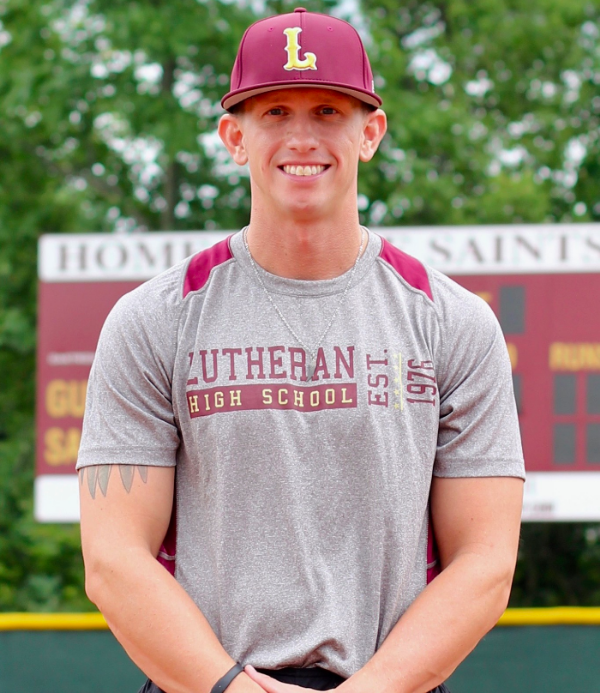
By STEVE KRAH
http://www.IndianaRBI.com
Promoting retention of concepts taught, Indianapolis Lutheran High School head baseball coach Adam Gouker is testing his players as they prepare for the 2022 season.
“People talk about the five tools of baseball (speed, power, hitting for average, fielding and arm strength),” says Gouker, who was hired prior to the 2020 season canceled by the COVID-19 pandemic and led the Saints on the field for the first time in 2021. “Baseball I.Q. or Baseball Awareness is the most under-taught part of baseball.
“We put players through mental training.”
Ramping it up in January, players will witness presentations on various parts of the game and then take an exam which produces a metric — a Baseball Academics Rating (BAR).
“We are by no stretch of the imagination the most athletic team, but we understand what to do with the ball (on defense),” says Gouker. “It makes us extremely competitive.
“It’s my favorite thing to teach. The guys eat it up and it builds passion.”
As co-founder and vice president of BAMFAM (Baseball Academics Midwest/Fastpitch Academics Midwest) and owner/operator of Extra Innings Indy South, Gouker has been testing players’ knowledge for years.
“I’m involved in a lot of instruction,” says Gouker. “Baseball is life.”
Gower also insists that his assistant Lutheran coaches get certified through Dugout Coalition.
“It’s a a really useful tool to make sure we’re all teaching accurately the same things,” says Gouker. “There are lot of coaches out there in the world that have been involved in baseball in the past and not enough recognition if those coaches are staying up with the latest and greatest in the sport.”
In getting Dugout Coalition-certified, coaches take in about 44 hours of online training and then must pass an exam.
Lutheran assistants for 2022 are Zach Akers, Tyler Danner, Josh Meaney, Russell Parker and Jonas Akers. Danner, Meaney and Parker are also BAMFAM coaches. Jonas Akers, son of Zach, is a former Lutheran player now attending Wabash College.
Another emphasis for Gouker’s Saints is base running. Players able to attend fall IHSAA Limited Contact Period practices (many others were involved in fall sports, including the state championship-winning Lutheran football team) worked on base running (reading pitchers, getting leads) and there will be more of the same when the next LCP window opens Dec. 6 along with arm strengthening, velocity care, defensive fundamentals, batting practice, weight training and — of course — mental training.
Lutheran’s high-octane running program produced 143 stolen bases in 2021 with four players in double digits for a squad that played 27 games.
Senior Sean Moore, a commit to Lake Erie College in Painesville, Ohio (where former University of Indianapolis assistant Landon Hutchinson is head coach) is coming off a 22-steal season as is senior Cade Tabit. Senior Cole Perkins swiped 19 in ’21.
“We had a pretty solid offensive year,” says Gouker. “We want to make sure their defensive side is as high as we can have it.”
The Saints play home games on-campus. The facility has recently had its mound and home plate areas re-built and lean bars added in the dugout.
“We want players up and engaged in the game,” says Gouker.
There’s also been talk of upgrading the backstop with padding and new netting.
Recent Lutheran graduates that moved on to college baseball include Matt Alter (Piedmont University in Demorest, Ga., and now at Hanover College) and Noah Wood (Lincoln Trail College in Robinson, Ill., and now at Franklin College).
Lutheran graduate Jared Broughton was once a Piedmont assistant and is now a volunteer assistant at Clemson University.
A feeder system for the high school are the Junior Saints junior high team (formerly coached by Greg Hughes), which had about a dozen seventh and eighth graders taking on area teams in 2021.
Lutheran (enrollment around 220) is a member of the Indiana Crossroads Conference (with Beech Grove, Cascade, Indianapolis Cardinal Ritter, Monrovia, Scecina Memorial, Speedway and Triton Central).
Conference games are played in home-and-home series on Tuesdays and Wednesdays.
“I like that format,” says Gouker. “This way you’re not facing the same pitcher each time and you can make adjustments from the first game to the second.”
In 2021, the Saints were part of an IHSAA Class 1A sectional grouping with Edinburgh, Greenwood Christian Academy, Morristown, Southwestern (Shelbyville) and Waldron. Lutheran has won 13 sectional titles — the last in 2019.
Lutheran’s social media includes Facebook and Instagram.
Gouker is a 2007 graduate of Alexandra-Monroe Junior/Senior High School who played at Anderson (Ind.) University. He has been married to high school sweethart Hannah since 2014. The couple has a son — Odin (10 months).



